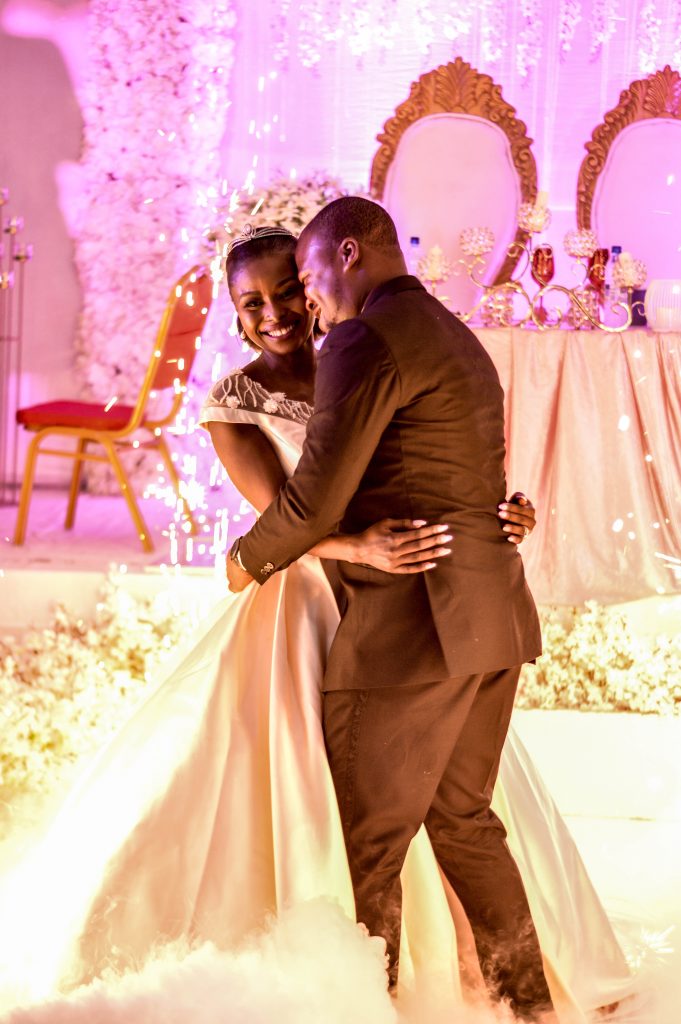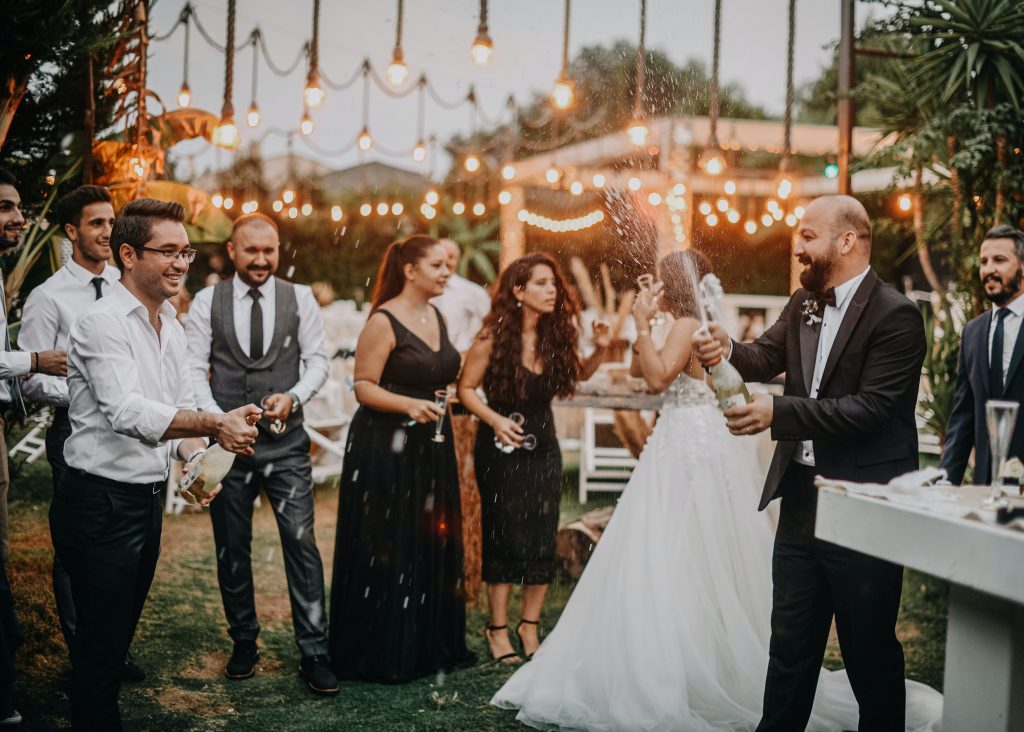How to Avoid Drinking Too Much at a Wedding: Tips and Strategies
Weddings exist to celebrate two people’s everlasting love—and for many families, this means booze, open bars, and plenty of toasts to the happy new couple.
But you might not want to get drunk at a wedding, especially if you’ve had a messy past with alcohol. And if you’re sober, it can feel daunting to try and get through one of these events without touching a drink.
So, what should you do if you don’t want to miss your loved one’s special day, but you also don’t want to go overboard with drinking? Here’s a guide to getting through the event safely.
Preparation: Before the Wedding Day
First things first: If you want to avoid getting drunk at a wedding, it’s key to plan ahead of time. Here are some good ways to prepare:

Invite a Sober Plus One
If you’re feeling nervous about attending the event, inviting a sober companion along can completely transform your experience. Sticking with your sober buddy means you’ll have someone to talk to and laugh with once the other guests start getting drunk and rowdy.
If you’re aiming for moderation as opposed to sobriety, you could also ask a friend or loved one to support your goals by drinking moderately with you.
Remind Yourself of Your “Why”
Before the day of the event rolls in, it can help to jot down a “reminder list” of all the reasons you cut back on the booze.
Maybe you’re doing it for your family, friends, or health. And perhaps you’re doing it to avoid the negative consequences of drinking—you’re concerned about embarrassing yourself, blacking out, or forgetting special days with the people you love. In any case, take some time to remember the why behind your alcohol use goals.
Plan How You’ll Decline the Alcohol
Saying “no” to alcohol shouldn’t feel like a taboo or strange thing to do—but sometimes, it can come with a hint of awkwardness (and we’ve all been there).
Thankfully, you can dodge any awkward interactions by planning a few ways to turn down drinks. For example, you can:
- Try a clever excuse. You could say you’re feeling unwell, trying to lose weight, or on medicine that cannot be mixed with alcohol.
- Say you’ve got to drive home and can’t drink. Everyone respects the designated driver role!
- Be direct and honest about your relationship with alcohol (if you feel comfortable enough to do so). It can feel strange to be so open, but you might be surprised at how receptive and supportive people can be.
Set Realistic Expectations
In the past, you might’ve been the type of person to party and dance until the early morning hours. But when you’re in recovery—and in a potentially triggering environment like a wedding—socially overexerting yourself might not be practical.
So, give yourself permission to only do what you can handle, and stay realistic about how the day will go. Book some self-care time before and after the event, take de-stressing breaks as needed, and don’t feel like you need to stay for hours after the ceremony if you’re just not feeling it.
The Day of the Wedding: Tips From a Ria Coach
Once you’ve laid the groundwork, it’s time to put your plan into action. Ria Health Coach Kerri Reyes offers some tried and true tips for the wedding itself, depending on your goals:
If Abstaining From Drinking:
- Find support – Talk through how you’ll handle the event with a friend or sober support ahead of time, and identify people who you can talk to during the event—even if it’s a phone call.
- Communicate & be transparent – Inform those you may spend time with at the wedding that you are not drinking, and ask for their support in that decision.
- Identify triggers – ID your largest triggers to want to drink, and then identify which ones may present themselves at the wedding. Plan how you’ll manage them beforehand.
- Drink something nonalcoholic – Choose “mocktails” or nonalcoholic versions/options from the bar—as long as this won’t trigger cravings for an alcoholic beverage. Many options can be easily made without alcohol.
- Remember any medication – If you’re taking any medication to support abstinence from alcohol, make sure to take it as prescribed.
If Moderating Your Drinking:
- Take your medication – If you have any prescription medication (like naltrexone), make sure to take it as prescribed to help with physical cravings and urges to drink to excess.
- Alternate! – Switch out alcoholic drinks with water or other nonalcoholic drinks. For every alcoholic drink you have, make sure to have a glass of water in between before your next one.
- Pace yourself! – Stick to one drink per hour; this also reinforces and requires mindfulness, which can help moderate and set the tone for the same.
- Set a drink goal before you go – For example, you could decide that you’ll have no more than 2-3 drinks during the timespan of the wedding.
- Find an ally – Share your goals and plans for moderating your drinking with someone who can be a support person for you at the wedding. You might even find someone willing to moderate with you.
More Tips For Getting Through a Wedding Without Drinking
Regardless of whether you plan on drinking moderately or skipping the booze completely, there are some things you can do during the event to make it easier on yourself—and more fun!

Keep Yourself Busy
One of the best ways to minimize wedding drinking is to keep yourself occupied! Put yourself front and center to help with setting up, cleaning, or tackling unexpected mishaps. Being helpful doesn’t just make you feel good—it also helps you keep alcohol off your mind.
Embrace the Shenanigans
Even if you’re avoiding drinking, there’ll still be plenty of guests who will have their fair share of alcohol. And since you won’t be able to avoid all the craziness, you might as well make the most of it.
So, lean in, dance, and participate in the fun that comes with being one of the only sober people at a drunk wedding. You might get a good laugh out of it!
Check In with a Therapist, Sponsor, or Friend
As noted above, plan on reaching out to your sponsor, therapist, or a good friend after the wedding is over. (This could also be your sober plus one if you’ve brought them along.)
No matter who your support person may be, this check-in can help you reflect, and close the night out feeling optimistic about your recovery.
If It’s Too Difficult, Skip It
Finally, as Ria Coach Kerri Reyes reminds us, you always have a right to say no to the event. “It is also completely OKAY to politely decline an invitation to a wedding, or leave early if need be (ie: only attend the ceremony vs. the reception) if the wedding may present too much of vulnerability for you around your drinking goals.”
It might feel very disappointing. But remember: Your overall well-being is the most important thing. Those who are closest to you will ultimately be glad you made the right decision for your health and recovery.
The Bottom Line
Weddings—like holidays, birthdays, and other celebrations—can be intimidating when you’re trying to change your drinking habits. Thankfully, you can avoid too much wedding drinking by planning ahead, finding support, and keeping yourself busy.
More Resources
For more support in drinking moderately or staying sober, Ria Health can help. Ria Health is an online program offering comprehensive support for those who want to quit or reduce their drinking. When you sign up, you’ll gain access to medical professionals, anti-craving prescriptions, recovery coaching, and more—all from your smartphone.
Learn more about how it works or get started today.
Will insurance cover treatment? Verify Coverage
Have Questions? Call (800) 504-5360



